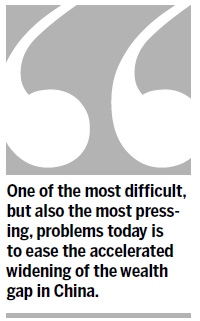View
Narrowing the wealth gap
Updated: 2011-03-07 08:06
By Zhang Monan (China Daily)
 |
Comprehensive reforms must be carried out to realize just and fair rebalancing between the haves and have-nots
The year 2010 marked the beginning of a new era for China, which overtook Japan to become the world's second largest economy, with a per capita GDP of $4,412.
Economic history tells us that a country's economic and social development will take a different course after its per capita GDP exceeds $4,000. If handled well, its economy will enjoy a relatively long period of rapid growth, resulting in higher per capita GDP. If the economy is not managed well, there will be fluctuations, even regression, resulting in the so-called middle-income trap characterized by capital centralization and widening income gaps. This leads to an imbalanced economic structure and sluggish domestic demand.
"It is not scarcity, but the unfair distribution of social wealth that poses the greatest challenge to a state," says an ancient Chinese idiom.
The income disparity and wealth gap in China have become more prominent in recent years. People's incomes and accumulated wealth have improved remarkably during the past three decades, but problems in wealth distribution have also developed.
Latest data shows that the Gini coefficient of China has reached 0.48, far exceeding the alarm level of 0.4. Data from the State Bureau of Statistics (SBS) also shows that in 2007 about 415,000 individuals, or 0.03 percent of the population, had personal assets of more than $1 million. Altogether this group of people grabbed $21.615 trillion, 60.1 percent of the national GDP.
In China, wealth is being accumulated by the rich at a rate that is growing by 12.3 percent a year, twice the global average.
To make matters worse, the unfair distribution of social wealth is being stabilized through transference to the younger generation. According to the Boston Consulting Group, the number of millionaires (in terms of US dollar) had risen by 31 percent in China in 2009. In the modern market, capital is taking an unbearably large share of the profits; that means the financial property in the hands of rich people is multiplying at such a high rate that it is stabilizing the unfair distribution of wealth.
Therefore, one of the most difficult, but also the most pressing, problems today is to ease the accelerated widening of the wealth gap in China. That requires systemic reform on a large and complex scale.
To realize this, the first step should be to promote justice in the process of income distribution. The State must establish a social mechanism that can improve and maintain an efficient allocation of resources and production efficiency by providing equal opportunities for all. In the past, many people held the belief that we should emphasize efficiency in the primary distribution of income, and ensure justice in the redistribution process; but actually, without justice in the primary distribution process, it is impossible to ensure justice in the redistribution.
Due to the premature market mechanism in China, there are too many inequalities in the primary distribution of national income, the most evident of which is monopolies. Those with monopolies of resources, such as land and mineral resources, have greedily accumulated wealth beyond imagination.
In the future, we should grant labor its deserved share of the national income, as well as setting up a mechanism that can ensure fair distribution among various producing elements, so that capital won't take an undeserved lion's share.
The second step should be to strengthen the role of tax in adjusting the unequal distribution of wealth. Currently the personal income tax threshold is being raised, but that will only adjust income distribution; the State needs to set up a wealth declaration mechanism so as to further adjust wealth disparity.
In most developed countries, taxes like inheritance tax, property tax and capital tax are very effective in narrowing the wealth gap, making it natural for capitalists to benefit the whole of society while gaining profit. In the United States, Britain and Canada, property tax accounts for more than 9 percent of the whole, much higher than that of China.
Last, but by no means least, a more comprehensive social security system is necessary, which could, as the last resort, neutralize the negative effects of the widening social gaps. Reforms in education, employment, residency registration and the pension system should be strengthened so that those on a low-income have the hope of moving up the social ladder.
Only major reforms can solve the problems of the widening social gaps, even if that means overcoming stiff resistance.
The author is an economics researcher with the State Information Center.
Specials

NPC & CPPCC sessions
Lawmakers and political advisers gather in Beijing to discuss major issues.

Self-made aircraft
An automobile mechanic in Northeast China made a test flight of his self-made aircraft which cost about US$395.

Venetian Carnival
Masked revellers celebrate in Saint Mark's Square in Venice.